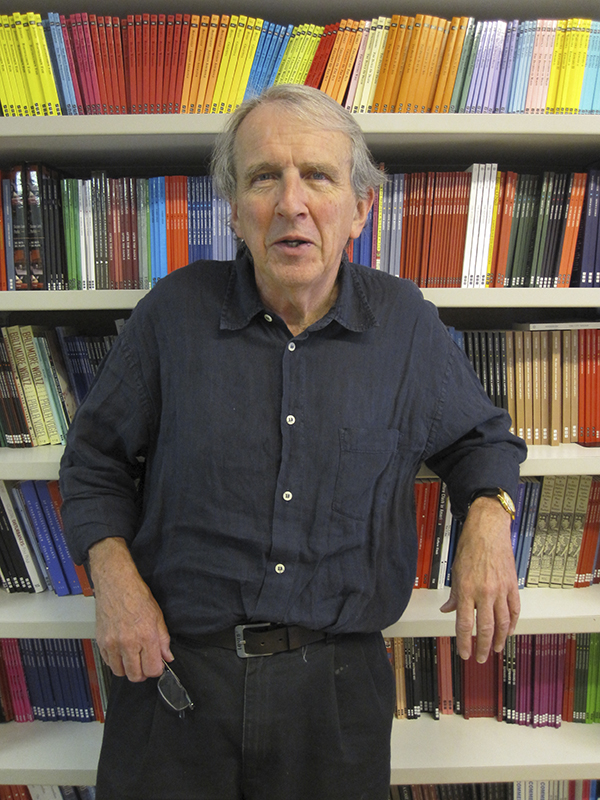Thirty years ago, Nick Hern launched Nick Hern Books, one of Britain’s leading publishers of plays and drama books. Susan Elkin spoke to him.
How did you get interested in drama in the first place? I did three plays at my prep school because I was told to: I played Prince Hal in Henry V and Sylvius the shepherd in A Winter’s Tale for example. I wasn’t talented, but it was a small school and I suppose I was the best they’d got at the time. It gave me a bit of confidence so that when I progressed to Tonbridge School as a boarder I auditioned for, and took part in, lots of plays. I also started going to the theatre as much as I possibly could.
What did you do at university? Well the school really only reckoned Oxford and Cambridge so I was a bit of maverick. I discovered, by chance, that Bristol University had a course in drama. Drama! I had no idea you could do it at university. Bristol was the first in the country to offer it and I went there on a scholarship. I had to combine it with a “sensible” subject (German) but nonetheless I really loved the course and I did lots of plays – a bit like Cambridge Footlights.
But you didn’t really want to be an actor? No and it was the right decision. I really wasn’t any good. I spent two disastrous years in advertising, hankering to get back to university because I’d enjoyed it so much. Drama departments were, by then, springing up and I taught, from age 23, for five years in the (then) tiny drama department at Hull followed by two years at Glasgow.
How did you get into publishing? I’d made it my business to know Jeremy Strachan, the drama editor at Methuen. He and I used to have lunch together occasionally. Then he got promoted and invited me to take the drama editor job which was a way of getting back to London. It all just fell into my lap and I stayed there for 15 years.
But in the end, it went wrong? Sort of. Methuen had become a valuable asset because it had published The Secret Diary of Adrian Mole. A takeover angered many of the authors and Harold Pinter took his next play to Faber. It was an unsettling and unhappy time for those of us working there.
What changed that? A call from Sebastian Walker of Walker Books who wanted a drama imprint to run alongside his children’s books empire. I asked him what we should call it. “Nick Hern Books” he said. Gradually I started to build a list until Sebastian got sick – brain tumour and AIDS, poor man – and began trying to rationalise his affairs by shedding parts of his business. I ended up as part of Random House and actually a drama list doesn’t fit in a big corporate company.
Was that when you cut loose? Yes, we’ve been independent since 1993. At the beginning I ran the company from my house which I had to remortgage in order to raise the capital. I was on my own apart from a bit of help from my younger daughter.
How did you make ends meet? Programme texts – those play texts which double up as programmes and are sold by the hundred in theatres – were a real life-saver along with two plays: Death of a Maiden and My Night with Reg. I remember driving to Criterion Theatre in my ancient VW and stopping at the stage door, as you could back then, and unloading 8,000 copies. Crazy! But it kept the business going.
And how does the business function today? We moved into the present premises in Shepherd’s Bush in 1997 and there are 30 people on the payroll including part-timers. Our hot desk is very hot. The reason it works is that the business is vibrant and regenerative. There are always new playwrights writing plays which need publishing. And although each one probably only makes a small amount of money if you have enough titles ticking over then it all adds up. We’ve got 15,000 books on our list. Really we’re still doing what we did in 1974 but on a larger scale.
What of the future? Well, Matt Applewhite is now the managing director and commissioning editor. My job title is publisher and I come in only three days a week. We knew we had to do e-books and Matt has also introduced apps and audio books. You have to stay abreast of change. Much of our core business, however, still lies in trade in international copyright. British theatre continues to be very highly regarded and the Americans sell six times as many of our plays as we do theirs.
Which titles sell best? Well the West End Producer books are fun. They’re the ones I take as a gift if I go to dinner with someone outside the industry. But they don’t sell as well as a really good teaching book and our over all best seller is Actions by Marina Caldarone and Maggie Lloyd Williams, a sort of thesaurus of action words to help actors to analyse and show what a character is doing.
You don’t strike me as the retiring type. What do you do when you’re not in the office? You’re right. I’m not going to retire and I’ve never really had hobbies. We live part of the week in the Cotswolds and I’m gradually – a bit reluctantly – getting drawn into gardening. And my wife and I are very well placed for theatre in Bath, Bristol, Stratford and Cheltenham so there’s a lot of that.



